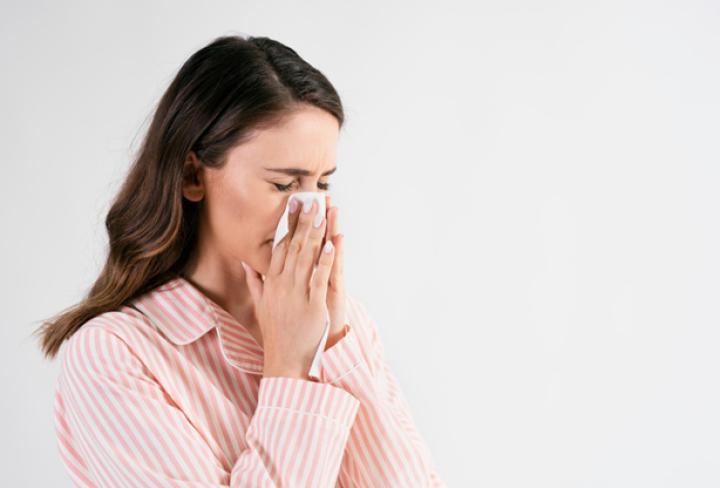Struggling to sleep because of a stuffy nose? Sinusitis might be the culprit. It can lead to swollen nasal passages, making it hard to breathe at night. This congestion results in sleepless nights, leaving you tired during the day. Sleep is crucial for staying healthy. It helps our bodies rest and recharge, readying us for the challenges of the day.
Understanding Sinusitis and Its Effects on Sleep
Sinusitis is when your sinuses, the hollow spaces in your skull, become inflamed. This happens often due to infections, allergies, or pollution. Common symptoms of sinusitis include a stuffy nose, facial pain, and headaches. Such symptoms make breathing hard, especially when you’re lying down.
At night, these symptoms can disrupt your sleep. When the airways are blocked, you might snore or wake up frequently. This leads to poor-quality rest, affecting how you function during the day. Knowing what sinusitis causes will help you fight it effectively.
The Connection Between Sinusitis, Climate, and Seasonal Changes in India
In India, weather shifts can trigger sinusitis. During monsoons, there’s more moisture, which can worsen nasal congestion. Dust and pollution in cities add to the problem.
To sleep better amidst these challenges:
- Use an air purifier to reduce allergens.
- Keep windows closed on windy days to prevent dust.
- Use heavy curtains to control the temperature.
- On dry days, keep a bowl of water near to add moisture.
- Adjust clothes for the climate, ensuring you neither overheat nor shiver.
Sinusitis triggers are all around, so it helps knowing how to manage your surroundings.
Prepping Your Sleep Environment for Sinusitis Relief
Helping your sleep environment is key to fighting nasal congestion due to sinusitis. Try these simple adjustments:
- Elevate Your Head: Use extra pillows to keep your head raised. This reduces nasal swelling and eases breathing.
- Keep It Clean: Dust and allergens can elevate sinusitis symptoms. Dust surfaces regularly and wash bedding weekly.
- Use a Humidifier: Moist air helps soothe irritated nasal passages. It’s especially useful in dry weather.
- Reduce Clutter: More items mean more dust. Keep your bedroom tidy.
- Choose The Right Bedding: Use hypoallergenic pillows to prevent allergic reactions, a key sinusitis trigger.
These adjustments are simple but effective for easing sinusitis at night.
Effective Nighttime Rituals
Before bed, simple rituals can ease sinusitis symptoms:
- Steam Inhalation: Fill a bowl with hot water and lean over it, covering your head with a towel. This clears nasal passages.
- Nasal Irrigation: Rinse your nose with a saline solution using a neti pot. This helps remove mucus and allergens.
- Warm Compress: Place a warm cloth on your face for a few minutes. It relieves sinus pain and aids sinus drainage.
Adding these steps to your nightly routine can offer significant relief.
Medication and Natural Remedies for Sinusitis
To manage sinusitis, some over-the-counter medicines can help, like nasal sprays or decongestants. But always check with a doctor before trying something new.
Natural sinusitis treatment options include:
- Herbal Teas: Mint or ginger teas can soothe the throat and ease congestion.
- Essential Oils: Oils like eucalyptus in a diffuser can open blocked sinuses.
- Hot Soups: A warm chicken soup might reduce congestion, too.
These combinations can reduce symptoms without needing strong medication.
Lifestyle Changes to Foster Better Sleep
Certain habits can lessen sinusitis symptoms:
- Dietary Adjustments: Avoid dairy and sugar, which can thicken mucus.
- Stay Hydrated: Water helps thin mucus, making it easier to expel.
- Light Exercise: A short walk can improve blood circulation and help reduce nasal inflammation.
- Stress-Relieving Routines: Simple tasks like reading or meditating can help relax the body, preparing it for rest.
By tweaking your daily habits, you can boost the effectiveness of your sinusitis treatment.
Addressing the Psychological Impact of Sleep Disturbances
Lack of sleep can affect your mental health, leading to stress and anxiety. Focus on:
- Deep breathing exercises to calm your mind.
- Short meditation sessions to refocus and reduce anxiety.
These techniques can help ease any psychological burdens caused by sinusitis-related sleep disturbances.
Seeking Professional Help for Persistent Sinusitis Issues
If sinusitis keeps returning, see a healthcare expert. They can diagnose the root issues and provide suitable solutions.
For chronic issues, options like nasal sprays or surgery might be considered, depending on the severity. Professional advice ensures you’re on the right path to efficient sinusitis treatment.
Conclusion
In summary, sinusitis can disrupt your sleep, but it doesn’t have to. By adjusting your sleep space, trying home remedies, and making lifestyle changes, you can sleep better. Implement these tips for a relaxing night despite your nasal congestion challenges.

